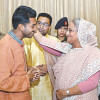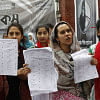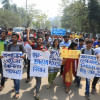What students saw and what they were told to believe

The recent Ducsu election, held after 28 years and for the first time since people's representation in government is said to have prevailed in the country, was another unfortunate nail in the coffin of our so-called democracy. Not that anyone had any high hopes from it after the last national elections. But the history of our people being able to exercise their right to choose their own representatives on a national level has always been murky; whereas, the history of the Ducsu elections was relatively untainted up until now. It will unfortunately be marred forever henceforth by the frauds and manipulations that turned this election into a farce.
While history will remember this for what it was, how will the students who were directly involved in it, and whose lives have or will be affected by it, see it?
Sadly, like history, they too will judge it with revulsion. And one of the primary reasons for that is—even more tragically—the role played by a few of their teachers and Dhaka University authorities.
But who can blame them? That those entrusted by them and their guardians to "teach" students about the democratic principles becoming of any civilised society and instil in them values deserving of being taught at a "higher educational institution", would lack them so abhorrently in their actions, is by no means a miniscule tragedy. And it is not a tragedy that one can easily brush under the rug as has so often been done lately.
Whereas teachers of this country had set excellent examples in the past, what students would have seen during this election are teachers who teach them about examples of upholding principles, but cower in the face of power, and indeed merge hands with those immorally exercising power, in exchange for the meagre attainment of such ill-gotten power for themselves. They would have seen those who talk about setting high moral standards, lacking them most severely in the midst of scores of young people whom they are apparently meant to guide towards ethical decision-making. What they would have seen was hypocrisy!
Furthermore, whilst more and more irregularities on the day of the Ducsu election surfaced, what the students would have also seen are blatant lies being told by the university authorities. And as they listened to the lies that threatened to betray what they had seen with their own eyes, they must have connected them with the number of irregularities they had seen to come to an understanding of what was really happening. Which is that those responsible for safeguarding the hopes, wishes and wellbeing of students were themselves responsible for taking them away—either through telling lies only, or worse.
As many of the students themselves expressed when calling for the resignation of the Dhaka University vice-chancellor, it is the latter that most of them seem to suspect. After all, without some involvement of those responsible for protecting the fairness of the election in the irregularity process, how else could they have so blatantly happened? What they would have seen are the double standards of university authorities who are rightly expected to hold students to account for cheating, as they allowed some to cheat and get away with it right in front of them—at the very least by refusing the demands of students to take a serious look into the evidence of irregularities.
In the midst of all this, what they also saw was some teachers courageously refusing to partake in this charade, holding fast to their principles and standing alongside the vast majority of students in declining to pretend as if nothing wrong was happening—to establish the kind of example one would expect university teachers to set. What they saw was a microcosm of what has been happening for some time now on a broader (national) level, i.e. the macrocosm.
From this, what they should have realised is that they too are a microcosm in the macrocosm that is their university (and the nation at large). If irregularities and immorality can prevail right now, then their opposite too can triumph in the future. The students can play a defining role in achieving that. And they should.
As Mr Ali Riaz brilliantly pointed out in an article in this newspaper recently, "The politics of delegitimising elections is meant to depoliticise the society." The attempt to delegitimise the Ducsu election too was an effort to depoliticise our student polity. And the reason why those behind such attempts to depoliticise the society/student polity believe them to be necessary, and would go to such lengths to do so, is because they believe change is possible. Thus there is no reason for the students to believe otherwise.
Granted that the odds they are up against are difficult—making the path to attaining positive and sustainable change long and hard which is exactly why those who are corrupt take the easy way out, as they did during the last elections. However, if one actually believes the pursuit of that difficult path to be meaningful and important—as believed by nearly all individuals that history ultimately seems to preserve—then one should stick to that belief, knowing full well the resistance they will come across, and recognising that it is they themselves who must learn how to overcome it.
Eresh Omar Jamal is a member of the editorial team at The Daily Star.
His Twitter handle is: @EreshOmarJamal










Comments